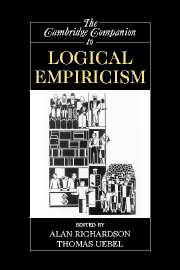Book contents
- Frontmatter
- Introduction
- Part I The Historical Context of Logical Empiricism
- Part II Logical Empiricism: Issues in General Philosophy of Science
- Part III Logical Empiricism and the Philosophy of the Special Sciences
- 7 The Turning Point and the Revolution: Philosophy of Mathematics in Logical Empiricism from Tractatus to Logical Syntax
- 8 Logical Empiricism and the Philosophy of Physics
- 9 Logical Empiricism and the Philosophy of Psychology
- 10 Philosophy of Social Science in Early Logical Empiricism: The Case of Radical Physicalism
- 11 Logical Empiricism and the History and Sociology of Science
- Part IV Logical Empiricism and its Critics
- Bibliography
- Index
- Series List
10 - Philosophy of Social Science in Early Logical Empiricism: The Case of Radical Physicalism
from Part III - Logical Empiricism and the Philosophy of the Special Sciences
Published online by Cambridge University Press: 28 January 2008
- Frontmatter
- Introduction
- Part I The Historical Context of Logical Empiricism
- Part II Logical Empiricism: Issues in General Philosophy of Science
- Part III Logical Empiricism and the Philosophy of the Special Sciences
- 7 The Turning Point and the Revolution: Philosophy of Mathematics in Logical Empiricism from Tractatus to Logical Syntax
- 8 Logical Empiricism and the Philosophy of Physics
- 9 Logical Empiricism and the Philosophy of Psychology
- 10 Philosophy of Social Science in Early Logical Empiricism: The Case of Radical Physicalism
- 11 Logical Empiricism and the History and Sociology of Science
- Part IV Logical Empiricism and its Critics
- Bibliography
- Index
- Series List
Summary
Philosophy of social science is unlikely to figure in many people's judgment as a field in which logical empiricism effected great progress. If anything, impressions run to the contrary. Considered in the right light, however, the riches of logical empiricist philosophy of social science were considerable. The trick is to find the proper lighting. Here the aim is to illuminate a much misunderstood early doctrine, not only for its intrinsic interest but also - alongside Chapters 3 and 11 but from a different angle - to highlight what was lost when central members of the Vienna Circle were marginalized in the heyday of orthodox logical empiricism.
THE PLURALITY OF LOGICAL EMPIRICIST PHILOSOPHIES OF SOCIAL SCIENCE, BROADLY CONCEIVED
For current purposes virtually all post-World War II philosophy of social science must be neglected. The reason is by no means that there is no good work in the field during that time by logical empiricists. Nor is the reason that in this period it is even more difficult to decide membership of the movement than in the previous one. It is rather that no figures central in pre–WorldWar II logical empiricism in this field remained to continue their work after the war. Given this discontinuity of personnel, the concentration here will lie on prewar logical empiricist philosophy of social science. Even so delimited, the field holds forgotten riches.
- Type
- Chapter
- Information
- The Cambridge Companion to Logical Empiricism , pp. 250 - 277Publisher: Cambridge University PressPrint publication year: 2007
- 16
- Cited by



